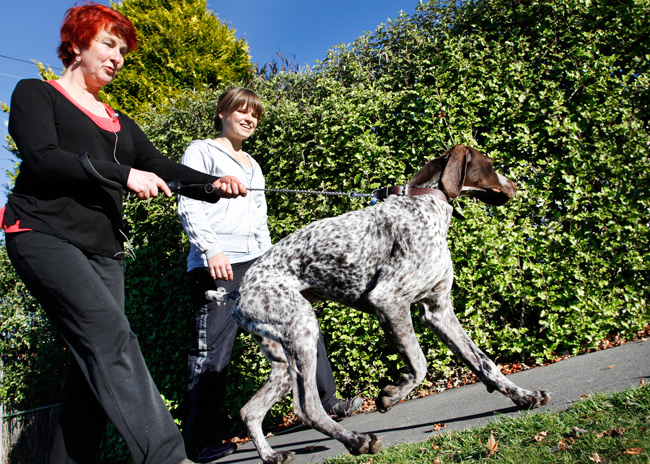
Physiotherapy honours student Carla Cameron heads out with Claire Dickie and her dog Omar as part of a study on how walking a dog influences a person's well being. Photo: Sharron Bennett.
University of Otago researchers are using a novel technique to find out how walking a dog influences a person's well being – hitting the pavements with their participants and their dogs.
The study, by School of Physiotherapy honours student Carla Cameron and the School's Associate Dean of Graduate Research Studies Dr Cath Smith, aims to assess whether these “mobile methods” are a feasible and acceptable way of capturing data.
The researchers walk or run with their participants, and at the same time record the conversation, video the walk and record their own observations about the sights, smells and interactions between the environment, participant and their dog, on the walk.
Ms Cameron says the method is giving them a great insight into how dog walking influences health and well-being.
“For example, I guess the first thing people would think about would be the physical fitness aspect of walking. But the study is showing us that there are many different ways that dog walking influences health and well being. We have noticed how many of our participants laugh frequently on dog walks and we know from the literature that laughter is a great health intervention. We have also noted possible adverse effects on health like increasing stress levels when dogs are not behaving well.”
Once this “mobile method” has been confirmed in healthy adults, the researchers hope to use it to look at how dog walking might benefit others.
“The whole reason that we are doing this study is to get a good handle on the benefits and drawbacks of using this method of collecting data on the move. We are trying them out in healthy adults because in the future we want to look at how dog walking might benefit people living with chronic conditions such as multiple sclerosis. We will use the results of this study in order to recommend how we best do this.”
The researchers have completed nearly all of their targets, but most participants have been female, so they would like to encourage any male dog walkers who work at the University to volunteer.
